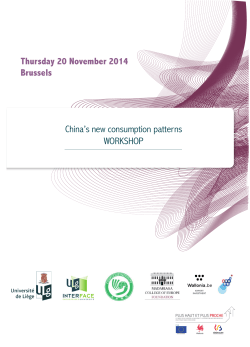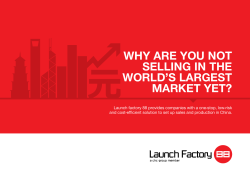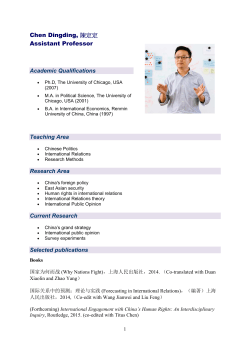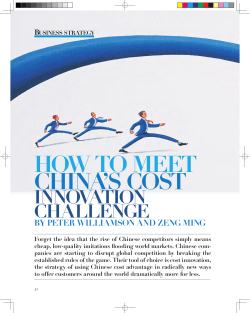
What power shift to China?*
POLICY BRIEFS No. 04/2012 ISSN 1653-8994 What power shift to China?* Guy de Jonquières Guy de Jonquières (guy.dej@gmail.com) is Senior Fellow at ECIPE That economic and financial power is shifting from west to east – and specifically to China – has become a mantra of our age, repeated so often and so insistently that it appears to be widely regarded as self-evident. Frequently, it is accompanied by the assertion China is set irreversibly on the path to global pre-eminence, if not outright domination. It is only a matter of time, it is sometimes suggested, before China rules the world. Exactly what China’s power consists of, how it might be exercised and for what purposes are left tantalizingly unexplained, however. It seems simply to be assumed that such a populous country, with an economy that has grown so big so fast, must have both the will and the capacity to impose its writ on the rest of the world.That assumption, and the premises that underlie it, are highly questionable. Undeniably, three decades of double-digit growth have given China impressive economic scale. It is the world’s second biggest economy, creditor nation and importer, its largest exporter and, by some measures, its most important manufacturing centre. It has the biggest current account surplus and foreign exchange reserves – at more than $3,000bn, roughly one third of the global total. And it is the world’s biggest consumer of such commodities as aluminium, iron ore and copper. SUMMARY As the west struggles under the double burden of anaemic growth and massive debt, the belief has become common that power is shifting to China. But while western influence in the world may be diminishing, it is by no means certain that China possesses either the will or the capacity to shape tomorrow’s international order to its own design and to impose its writ on other nations. Though western disarray has emboldened China to assert its interests and resist external pressures more robustly, it shows little sign of having any coher- ent global agenda, beyond demanding international respect and securing its own material prosperity. Its foreign policy is conspicuously more effective at communicating those things China does not want than at articulating those that it does. Furthermore, China’s economic power is often over-estimated. The importance of maintaining growth at home and the country’s rapid integration with the world economy have created an incentive to preserve the stability of the international system and tempered the impulse to engage in nationalistic muscle-flexing or disruptive actions abroad that could damage its own well-being. Domestic priorities and pressures, not the pursuit of global dominance, will remain the main determinants of China’s approach to international relations. However, current battles between its rulers about whether to step up the pace of economic and political reform signify deep divisions about the direction of policy. The echoes are likely to reverberate well beyond China’s borders. * This text appears in a forthcoming report from LSE IDEAS, ‘China’s Geoeconomic Strategy’, that will be launched at the London School of Economics on the 29th May However, those achievements need to be set in perspective. A hundred years ago, well before it became a global superpower, the US had already been the world’s biggest economy for a decade and accounted for a fifth of world GDP, considerably more than twice as much as Germany and Britain, the next largest economies, combined. On the most generous purchasing power parity (PPP) measure, China’s GDP today is only two thirds that of the US – and less than half at nominal exchange rates - and its growth rate is set to slow in the coming years. Furthermore US income per capita a century ago was the highest in the world, almost 10 percent more than that of Britain, its closest rival. China’s per capita income today is barely one sixth of the US level on a PPP basis, and only one tenth at nominal exchange rates, and ranks about 90th in the world league table. Relative to other countries, China now is a vastly poorer country than the US was then. In any case, economic size does not, of itself, confer international influence. Japan, at its economic apogee in the 1980s, had the world’s second largest GDP, a huge current account surplus, bulging foreign exchange reserves and a worldbeating manufacturing sector.Yet, despite widespread predictions that it was set to become a dominant power, it never translated those strengths into matching political or diplomatic influence, let alone leadership. And two centuries ago, when China was the world’s biggest economy, with a GDP larger than the whole of western Europe, it was largely closed off from the world. It is true that the west’s ability to influence China – insofar as it exists – is in decline. But that is as much because the financial crisis of 2008 has sapped the west’s economic strength and moral authority as because of China’s rise. No longer is China prepared to be lectured on its behavior by those who once treated it as a precocious pupil, when their own affairs are in disarray and when, in Europe’s case, they are looking to China to bail them out. China’s success in riding out the crisis and the west’s economic weakness have inspired in it greater outward self-confidence, sometimes even hubris. Beijing has been emboldened to stand its ground more firmly in dealings with the rest of the world, in both bilateral and multilateral forums, from climate change talks to the G20, the International Monetary Fund and the World Trade Organization. If China was ever amenable to bullying or coercion, it is noticeably less so today. It is also ready to use economic pressure to get its way with smaller or more vulnerable countries – by, for example, insisting that South Africa dis-invite the Dalai Lama from Archbishop Desmond Tutu’s birthday celebrations last year. Yet instances of China harnessing economic means to purely political ends are rare – and when it has tried to do so, it has often not succeeded: for instance, its attempts to get southern Eurozone members to press Brussels to grant it Market Economy status in exchange for buying their debt have gone nowhere. Generally, China has proven a hesitant paymaster, apparently more interested in achieving secure prudential returns on its money than in using it to procure strategic geo-political advantage. It has responded coolly to more recent pleas to lend more to the Eurozone, insisting that its governments first show they are serious about putting their financial house in order. It has also displayed a strong preference for channeling any future financial support through the IMF, rather than directly.This speaks not of a boisterous superpower eager to throw its weight about, but of an uncertain investor worried about being sucked into a bewildering political and financial minefield and keen to have others lead the way. One area where Beijing has attempted, with mixed success, to use economic muscle is in domestic industrial policy. It has sought, for instance, to compel foreign companies to hand over proprietary technologies in exchange for access to its market and to give indigenous producers an edge by seeking to impose national technical standards. However, the clear aim of such policies is commercial, not political, gain. 2 ECIPE POLICY BRIEFS / No 02/2012 A RELUCTANT GLOBAL AGENDA-SETTER Beyond its own borders, the defining feature of Chinese power is defensive: the power to say no.That is not unimportant at a time when needy sovereign borrowers outnumber well-heeled lenders and when China’s assent is essential to effective international co-operation in a growing number of fields. China is, however, strikingly reticent about contributing to setting the global agenda - and even more so about plotting grand hegemonic strategies of the kind beloved of western conspiracy theorists and some nationalistically-minded Chinese. Such caution is in line with Deng Xiaoping’s much-quoted injunction to “stand firmly, hide our capabilities, bide our time, never try to take the lead” in international affairs. Though Beijing has recently deviated dramatically from that axiom in some areas of foreign policy, notably in its aggressive – and spectacularly counter-productive - outbursts towards east Asian neighbours in 2010, it continues to govern its economic and financial dealings. Indeed, the rationalism that has long informed China’s approach to economic affairs has repeatedly prevailed over recurrent pressures to give nationalism the upper hand in foreign policy. China’s leaders know that if sabre-rattling and brinkmanship got out of control, they could swiftly backfire, imperiling the stable international economic conditions on which the country’s welfare and prosperity – and, crucially, the regime’s claims to legitimacy – hinge. That is a point too often overlooked in discussion about China’s impact on the world economy. In reality, the world economy’s impact on China has been at least as great, if not greater. Indeed, in a number of important respects, China today needs the west considerably more than the west needs China.The most important is to generate demand and thereby growth. China’s rise has benefited raw materials exporters worldwide, but its relatively low level of domestic consumption limits its market for many goods and services of the kind made in the west. However, the west’s markets still matter a lot to China.The European Union is the biggest destination for its merchandise exports, accounting for roughly a fifth of the total; yet China buys barely a tenth of extra-EU exports and their value overtook those to Switzerland only in 2010. Much as western politicians may carp about China’s surpluses on bilateral trade, they are actually a symptom of Chinese economic dependence. Five main objectives underlie China’s foreign economic policy, all of them heavily inspired by domestic concerns: • Maintaining open world markets for its exports, more than half of which are produced by factories that are wholly or partly foreign-owned. • Securing access to international supplies of energy and natural resources, to fuel the economy’s industrial development. • Insulating the economy and national wealth from potentially de-stabilizing external shocks. • Acquiring new technologies, knowhow and skills. • And promoting the global expansion of national industries through investment abroad. Those objectives are not always pursued in a consistent, let alone transparent, manner.The formulation of foreign policy in any country is complex, shaped by the interplay of diverse pressures and interests. They are especially difficult to disentangle in China, both because policy-making is highly opaque and because recent years have seen a rapid expansion of the number of foreign policy actors, whose relative influence can vary from case to case. 3 ECIPE POLICY BRIEFS / No 02/2012 China’s global quest for energy and natural resources is a case in point.This is sometimes portrayed as a concerted stateled strategy to secure sources of supply. In reality, it is driven as much by the ambitions of state-owned companies and their top executives, which effectively control much of the relevant policy-making machinery, and by scarce reserves and tight price controls at home, which force them to look abroad for profitable growth. A remarkably small proportion of resources that Chinese companies extract or produce abroad – as little as 10 per cent, in the case of crude oil – is shipped back to China: most is swapped or sold on international markets. Furthermore, as latecomers, Chinese resources companies necessarily focus heavily on regions where their western competitors are not already entrenched or are, for one reason or another, barred from operating. Since most resources are fungible, the effect of Chinese companies’ international expansion is not to “lock up” supplies but, rather, to augment at the margin those available on world markets. That both casts in a different light scare stories about a supposed Chinese “takeover” of resource-rich countries in Africa and elsewhere and raises questions about the coherence of foreign policy. Overall, China’s external economic dependence has induced prudence. Recurrent tensions with Tokyo have been contained by Beijing’s awareness of Japan’s importance as a trade partner and valued source of advanced technologies, capital goods and investment. Equally, China has been adept, so far at least, at telegraphing tactical concessions designed to de-fuse pressures in the US Congress for trade sanctions over its exchange-rate policy. And while its companies have been stepping up acquisitions of assets abroad, they have been careful to avoid any rash moves that could trigger a political backlash of the kind provoked in Washington by China National Offshore Oil Corporation’s landmark hostile takeover bid for Unocal, the US oil company, in 2005. Admittedly, Beijing’s embargo since 2010 on exports to Japan of rare earths, of which China is almost the only producer, in retaliation for the arrest of a Chinese trawler captain in disputed waters, is an exception from its traditional reluctance to use commercial weaponry against a significant trade partner. It is still unclear whether this is an isolated incident or presages a shift to more aggressive economic diplomacy. However, it has not stopped China, Japan and South Korea moving ahead with plans for a free trade agreement nor thwarted discussions between Beijing and Tokyo on possible currency co-operation. In any case, the export restrictions have so far proved ineffectual and may yet be self-defeating. Not only have they failed to cut off Japan’s access to rare earths, which are freely smuggled out of China; the sharp price rise caused by Beijing’s actions has spurred investment in production elsewhere that may in time break China’s near-monopoly over supply of the minerals. A $3 TRILLION INVESTMENT DILEMMA None of the trappings of supposed Chinese power excites greater international attention or discussion than its financial resources and, in particular, its massive foreign exchange reserves.These are frequently held up, at home and abroad, as emblematic of the country’s economic strength and of its emergence as a heavyweight player on the global stage. Yet that is not a view apparently shared by China’s rich, many of whom seem to lack confidence in the future of its economy. Evidence, official as well as unofficial, suggests that wealthy individuals are smuggling ever larger sums abroad, while a survey of Chinese millionaires last year found that more than half wanted to emigrate in search of a better life. Contrary to received wisdom, China’s foreign exchange reserves are only partly a reward for economic success; they can also be viewed as the product of skewed policies that have inhibited its economic performance.Their value has been swollen by large balance of payments surpluses that have built up since earlier this century. These stem partly from net 4 ECIPE POLICY BRIEFS / No 02/2012 export earnings and capital inflows. But their principal cause is structural: a persistent excess of domestic savings over investment. Put another way, the external surpluses have been acquired at the price of repressing Chinese living standards. There are several reasons for China’s exceptionally high savings ratio. They include lack of a comprehensive social security system, which induces households to make precautionary savings to pay for retirement and ill-health; failure to tax and require dividend payments by state-owned enterprises; and a high savings rate by the government itself.Though Beijing acknowledges the need to tackle these challenges, it is moving only gradually to do so. The reserves are dead money as far as China’s own development is concerned, contributing nothing to national prosperity. They cannot, in practice, be spent at home because converting them into renminbi would either trigger higher inflation or put strong upward pressure on the exchange rate – both outcomes that the government is anxious to avoid. They have, therefore, to be invested abroad. However, finding a home for more than $3,000bn is not easy. Few financial markets are large or liquid enough to absorb such vast sums easily – and most are in the west. As a big market player, furthermore, China cannot switch out of investments rapidly without risking substantial losses on them – and consequent fierce criticism from nationalistic sections of public opinion and the Communist party that view the reserves as precious patrimony. The Euro crisis has sharpened the dilemma. With as much as one quarter of its reserves in Euro-denominated assets, China has a big stake in the health of the single currency. On the other hand, it is clearly reluctant to increase its exposure by propping up troubled, and in some cases insolvent, Eurozone members through further large-scale further purchases of their sovereign bonds - especially as their neighbours are balking at doing so. In that sense, China is caught in a trap, to a considerable extent of its own making. It is less master than victim of circumstance, confronted with an array of awkward choices that circumscribe its room for manoeuvre. An emerging giant, maybe, but in some respects a muscle-bound one. In search of an escape route and, in particular, of ways of reducing dependence on the US dollar, China is taking steps to promote international use of the renminbi. They include agreements with selected partners to use the currency to finance bilateral trade – chiefly China’s imports – the launch of an offshore “dim sum” bond market in Hong Kong and the authorization of limited purchases of domestic Chinese bonds by Japanese investors. So far, investors’ response to these initiatives has been less than overwhelming. Not only do they appear to meet no strong commercial need, but they have offered little opportunity for profit and in some cases have been a recipe for losses. Indeed, market demand appears to have been heavily inspired by speculative short-term expectations of a further appreciation of China’s currency and has subsided as those expectations have ebbed. It is, in any case, unclear how much “internationalization” can achieve as long as China’s extensive capital controls keep the renminbi unconvertible. A first, tentative, step was made towards liberalisation in April, by widening the band within which the currency is allowed to fluctuate. However, moving to full convertibility could place enormous strains on China’s primitive and ossified financial system, unless it were first radically overhauled and modernized. That may well be the real agenda of the policymakers promoting RMB “internationalization”, who hope it will increase pressure on a reluctant and divided Chinese leadership to launch the reforms needed to improve the efficiency of capital allocation and remove the severe distortions the system generates. If so, they face potentially formidable obstacles. One is predictable resistance from powerful interest groups that benefit from the current system: local governments, the banks for which it guarantees fat profit margins and the state-owned 5 ECIPE POLICY BRIEFS / No 02/2012 enterprises for which it provides capital on preferential terms. More important still is opposition from conservatives in the political establishment who argue that financial liberalization would not only destabilize the economy but, even more crucially, rob the Communist party of a vital lever of control. Such arguments between liberalizers and conservatives extend well beyond the financial sphere. They are at the heart of the violent internal party conflicts waged in advance of the transition to a new leadership later this year. Their outcome is still unclear, but it seems certain to be of huge, possibly decisive, importance for the future conduct of Chinese economic policies, abroad as well as at home. A WORLD-SHAKER, BUT NOT YET A WORLD-SHAPER For three decades, China’s approach to international affairs has been shaped by one over-arching imperative: the pursuit of rapid economic growth and development at home.That has placed a premium on maintaining stable external relations, above all with the US, while avoiding the distraction of foreign entanglements and leaving others to shoulder the burdens of global leadership. The approach has served China well, freeing it to focus on pressing domestic priorities and challenges. However, it has also bred a distinctly inner-directed attitude that has prized preservation of the status quo abroad and minimizing the impact of disruptive external events at home.What China expects or desires from the world, beyond international respect and the fulfillment of its immediate material needs, remains unclear: Beijing is decidedly better at saying what it does not want than at identifying what it does. Chinese diplomacy, likewise, has been ruled by the self-interested axiom of “non-intervention” in other countries’ external affairs – though how far it has been honoured in practice is debatable. Beijing has relied heavily for influence, especially in other developing countries, not on “soft power”, a commodity in limited supply in China, but on the hard currency of money, investment, commerce and the promise of material gain. Furthermore, in contrast to the US, China has few, if any, close allies and several, such as Burma and North Korea, count among the world’s undesirables. Its intentions often inspire suspicion elsewhere, and relations with fellow members of the Brics are marked as much by differences as by common ground, which have prevented them even uniting behind a candidate to head the World Bank.The fate of proposals to set up their own development bank and stand together in the IMF, discussed at the Brics’ summit in March, will be a test of whether their solidarity is more than rhetorical. All this has left China cutting a somewhat isolated figure on the world stage, deliberately shying away from active engagement in issues that do not impinge directly and immediately on its most obvious national interests. That seems a narrow and unpromising platform from which to launch a bid to become the world’s dominant power. However, perhaps the most relevant question for the future is not whether China possesses the ambition or the capacity to achieve that goal. It is whether it can avoid being drawn into accepting more global responsibilities than it has so far been prepared to exercise – and how well it is equipped to carry them out. The reason it may need to is, simply, that China’s growing importance and its accelerating integration with the global economy will compel it. Not only does the impact of its own actions increasingly reverberate around the world, but its dependence on foreign sources of raw materials, energy, technology and markets increasingly expose it to complex and often unpredictable political developments beyond its own borders. 6 ECIPE POLICY BRIEFS / No 02/2012 Relying on opportunistic use of the chequebook to further national economic interests, while sheltering on the diplomatic sidelines, is likely to become harder when, as in the Middle East, those interests can suddenly be placed in jeopardy by violent political upheavals. Equally, China’s large stake in an open world trade system ought to provide an incentive to work more energetically to strengthen it, especially if it is threatened by a resurgence of protectionism. Addressing these challenges would require making choices, of a very different and more complex kind than those to which China is accustomed. It would also mean articulating a more wide-ranging and forward-looking vision of national self-interest that went beyond short-term expediency and meeting immediate material needs. Over the past three decades, China has shown that it can shake the established world order. It has yet to show that it can help shape a future one. 7 ECIPE POLICY BRIEFS / No 02/2012 LATEST PUBLICATIONS: The International Services Agreement (ISA) — from the Chasing Paper Tigers – Need for caution and priorities in EU countervailing duties (CVDs) European vantage point ECIPE Policy Brief No. 01/2011 ECIPE Policy Brief No. 3/2012 By Hosuk Lee-Makiyama By Hosuk Lee-Makiyama, Natalia Macyra, Michal Krol The Rising Trend of Green Protectionism: Biofuels and the European Union Digital Authoritarianism: Human Rights, Geopolitics and Commerce ECIPE Occasional Paper No. 5/2011 By Fredrik Erixon, Hosuk Lee-Makiyama ECIPE Occasional Paper No. 2/2012 By Fredrik Erixon Indian Trade Policy After the Crisis ECIPE Occasional Paper No. 4/2011 FTAs and the crisis in the European car industry By Razeen Sally ECIPE Policy Brief No. 02/2012 By Hosuk Lee-Makiyama, Michal Krol The Crisis and the Global Economy: A Shifting World Order? A New Era for Transatlantic Trade Leadership ECIPE Occasional Paper No. 3/2011 A Report from the Transatlantic Task Force on Trade and Investment By Razeen Sally By Transatlantic Task Force on Trade and Investment Is the Renminbi Undervalued? The Myths of China’s Trade Surplus and Global Imbalances Industrial Policy in Europe Since the Second World War: ECIPE Working Paper No. 2/2011 What Has Been Learnt? By Sylvain Plasschaert ECIPE Occasional Paper No. 1/2012 Chinese Trade Policy After (Almost) Ten Years in the WTO: A Post-Crisis Stocktake By Geoffrey Owen ECIPE Occasional Paper No. 2/2011 China’s Challenge By Razeen Sally ECIPE Policy Brief No. 01/2012 Value For Money: Getting Europe’s Trade and IPR Policy Right By Guy de Jonquières ECIPE Occasional Paper No. 1/2011 What is Driving the Rise in Health Care Expenditures? An Inquiry into the Nature and Causes of the Cost Disease ECIPE Working Paper No. 05/2011 By Fredrik Erixon A Guide to CAP Reform Politics: Issues, Positions and Dynamics By Erik van der Marel, Fredrik Erixon ECIPE Working Paper No. 3/2011 Future-Proofing World Trade in Technology: Turning the WTO IT Agreement (ITA) into the International Digital Economy Agreement (IDEA) By Valentin Zahrnt ECIPE Working Paper No. 04/2011 By Hosuk Lee-Makiyama The European Centre for International Political Economy (ECIPE) is an independent and non-profit policy research think tank dedicated to trade policy and other international economic policy issues of importance to Europe. ECIPE is rooted in the classical tradition of free trade and an open world economic order. ECIPE’s intention is to subject international economic policy, particularly in Europe, to rigorous scrutiny of costs and benefits, and to present conclusions in a concise, readily accessible form to the European public. We aim to foster a “culture of evaluation” – largely lacking in Europe – so that better public awareness and understanding of complex issues in concrete situations can lead to intelligent discussion and improved policies. That will be ECIPE’s contribution to a thriving Europe in a world open to trade and cross-border exchange. www.ecipe.org Phone +32 (0)2 289 1350 Fax +32 (0)2 289 1359 info@ecipe.org Rue Belliard 4-6, 1040 Brussels, Belgium
© Copyright 2025











